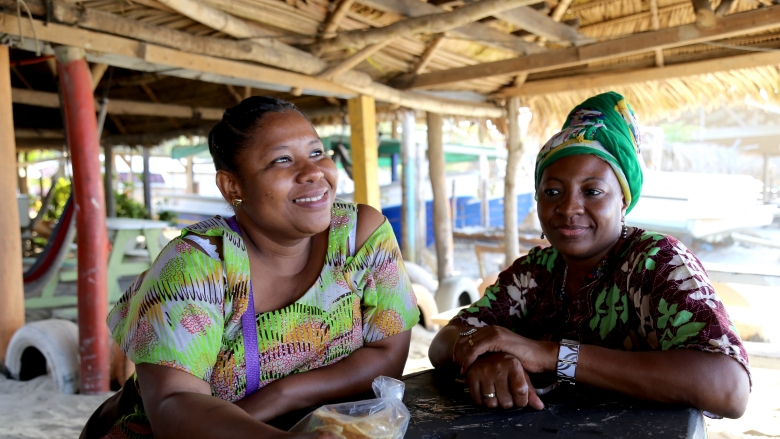This story is part of a series that focuses on the importance of social inclusion and the need for a concerted global effort to ensure everyone can lead equal, dignified, and empowered lives. It will highlight the challenges, opportunities, voices and experiences from marginalized ethnic communities. Follow #EveryoneEqual for updates on new stories
Yimene Calderón’s Garífuna community, descendants of indigenous Arawak-Caribs and African captives, from Honduras, grapple with a persistent lack of opportunities. There is discrimination in the job market and steep challenges with the pursuit of formal education. Their living conditions have improved in the last decade, but they still face gaps in access to essential services, including health, education and employment. The community has few medical centers, which often lack medical supplies, doctors and bilingual support. As a result, the Garífuna are more likely to live in slums and chronic poverty.
“We have 90% unemployment, jobs are really scarce,” said Calderón, who is the executive director of the Ethnic Community Development Organization (ODECO). For many, informal jobs like street vending is the only recourse. “There are really few people with a regular salary; on cash transfers, you can imagine how difficult it can be to build a family with this,” she told the World Bank.
Calderón and other Garífuna are some of the 130 million Afro-descendants living in Latin America. From Afro-indigenous communities like the Garífuna of Central America, to the pardos of Brazil, Afro-descendants have historically been excluded on the basis of their racial identity and typically stigmatized and stereotyped. Those like Calderón are also overrepresented among the poor, a phenomenon that is common in the region.
Photo Credit: Jessica Belmont / World Bank
“Historically, they used to say that since 1932, we didn’t have any Afro-descendants in El Salvador, but here we are,” said Lidia Margarita García, an expert on gender at the country’s Ministry of Culture. “They even said there were no indigenous people, but there were and they have always been there, just not recognized.”
The COVID-19 pandemic has laid bare the disparities faced by these vulnerable groups in education, health systems and jobs and other areas. Latin America is one of the regions worst hit by COVID-19, and while there is little data on the impact on different groups, experts believe that minorities such as Afro-Descendants likely suffer more.
Carlos Álvarez, Director of Ethno-Racial Equality, Migrants and Refugees in Argentina, said that the crisis has deepened over the past few months, affecting most those who were already vulnerable. “Emergency actions to guarantee food and shelter are particularly needed for the most vulnerable Afro-descendants, such as refugees and migrants,” said Álvarez. He highlighted that universal policies can sometimes not be enough as part of a dialogue that has begun at the World Bank to fight against racism.
Afro-Descendants are predominantly urban, and due to historical isolation and neglect, tend to be concentrated in some areas and cities more than others. In many Latin American countries, Afro-descendants are twice as likely to live in slums than non-Afro-Descendants and often have poor access to basic services like healthcare and education. These are factors that explain why the crisis might affect Afro-descendants disproportionately. Non-Hispanic black persons are 5 times more likely to be hospitalized because of the disease, evidence that a similar trend will be seen in Latin America.
Countries responded relatively quickly to the crisis drawing on pre-existing programs that provide cash transfers and community-driven development initiatives that empower citizens to shape their own priorities and solutions. But the worst hit were left out due to information gaps and informal workers not qualifying for certain benefits. COVID-19 exacerbates these inequalities and comes just a year after protests erupted across the region motivated by living conditions in these settings.
The crisis provides an opportunity for rethinking the region’s structural inequality and moving towards a sustainable and inclusive recovery. The World Bank continues to place efforts on supporting social development, focusing on the need to put people first. Development investment and economic growth can leave certain groups behind and produce unequal benefits. To avoid this, the World Bank is committed to protecting those who are marginalized, especially during the global crises, when they can be more vulnerable than other groups.
Photo Credit: Jessica Belmont / World Bank
A World Bank study identifies the underlying drivers of the exclusion of Afro-descendants in Latin America and offers solutions. No single recommendation will suit all situations and policies must be aimed at several sectors and account for intersecting disadvantages. How goals are achieved must be clear, with special consideration paid to increasing peoples’ participation in decision making.
The study concluded that education is a vital tool in ensuring inclusive growth for Afro-descendants. When education is truly inclusive and caters to the needs of the marginalized and most vulnerable, it often results in increased opportunities for these groups to lead prosperous, independent lives free from poverty.
“In terms of education, yes we have schools in all the communities, and some of them till 9th grade, but the challenge is - how many youth have been completing secondary education?” said Calderón.
During this time of global upheaval on racial discrimination, we recognize that poverty is not only delineated by low income. It also concerns exclusion, unaccountable institutions, powerlessness and persistent racism. At the core of the World Bank Group’s development mandate is a commitment to protect those who are most vulnerable so that everyone – regardless of their gender, race, religion, ethnicity, age, sexual orientation or disability – can access the benefits of development.
For Afro descendants, having a meaningful voice that drives action is critical. As stated by Calderón, “the most interesting thing is to see how the community voice… can be translated into public policy, in actions, in programs, that can contribute to change this difficult situation.” She goes on to say, “we can join all these voices to create/build important ideas and proposals.”

